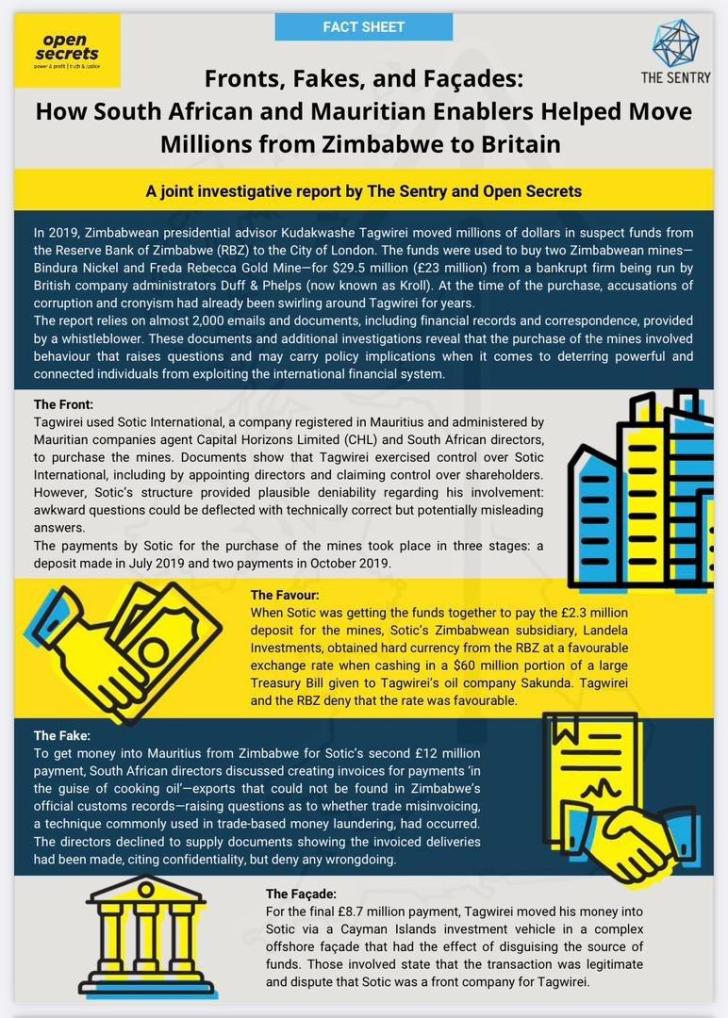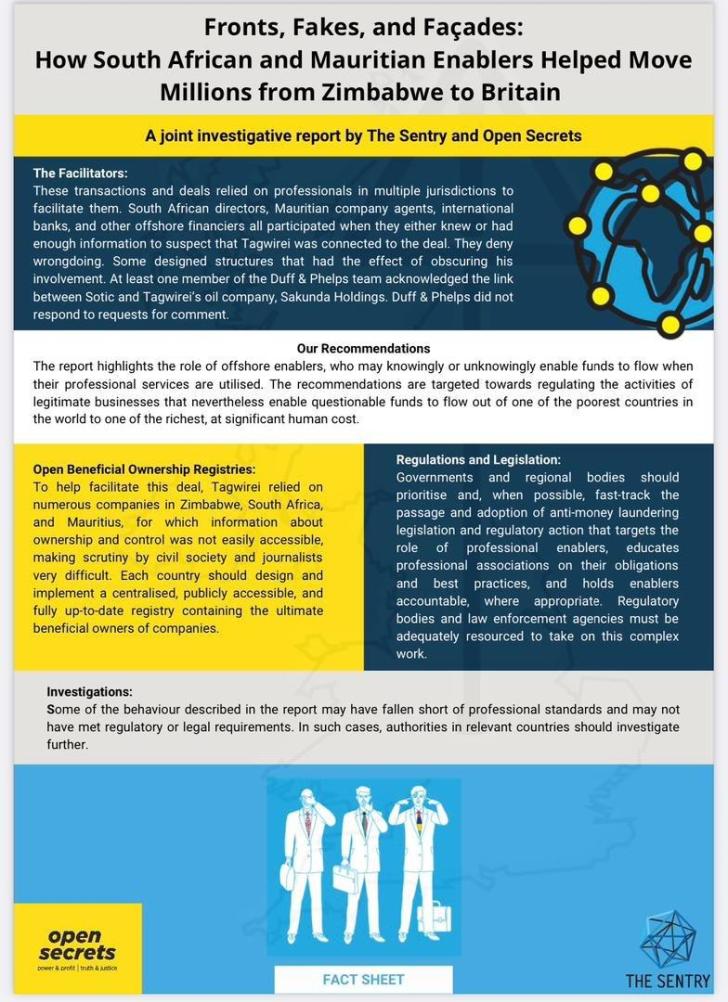News / National
Attacks on Zimbabwe by US shadow organisations escalate
06 Jul 2023 at 08:16hrs |
4 Views
A new investigative report by The Sentry and Open Secrets, United States organisations which probe and follow dark money and illicit financial flows around the world - given to The NewsHawks and other media platforms in advance, but now circulating all over social media, says Zimbabwean tycoon Kudakwashe Tagwirei moved "suspect funds" from Harare through the Reserve Bank of Zimbabwe and some fronts in Mauritius to London to buy two Zimbabwean mines - Bindura Nickel and Freda Rebecca Gold Mine — for $29.5 million (R431 million, £23 million) from ASA Resource Group (ASA), a bankrupt firm that was being run by British company administrators Duff & Phelps (now known as Kroll).
The investigative report says:
"A politically-connected oil tycoon moved suspect funds from the Reserve Bank of Zimbabwe (RBZ) to the City of London using fronts, false invoices, and offshore financial façades, documents reveal.
"In 2019, Zimbabwean presidential advisor Kudakwashe Tagwirei used Sotic International, a Mauritian company that documents reveal acted as his front to disguise his involvement, to buy two Zimbabwean mines—Bindura Nickel and Freda Rebecca Gold Mine—for $29.5 million (R431 million, £23 million) from ASA Resource Group (ASA), a bankrupt firm that was being run by British company administrators Duff & Phelps (now known as Kroll).
"At the time of the purchase, accusations of corruption and cronyism had already been swirling around Tagwirei for years. South African directors, Mauritian company agents, and offshore financiers—all of whom deny that their work for Sotic involved wrongdoing—created structures that had the effect of disguising where the money came from. At least one member of the Duff & Phelps team had reason to know there was a link between Sotic and Tagwirei’s oil company, Sakunda Holdings, emails show.
"The payments by Sotic to purchase Bindura Nickel and Freda Rebecca Gold Mine took place in three stages: a deposit made in July 2019 and two payments in October 2019.
"Each stage involved behaviour that raises questions and may carry policy implications when it comes to deterring powerful and connected individuals from exploiting the system:
1. The favour. During the period when Sotic was getting the funds together to pay the £2.3 million deposit, Sotic’s Zimbabwean subsidiary, Landela Investments, obtained hard currency from the RBZ at a favourable exchange rate when cashing in a $60 million portion of a large Treasury Bill given to Sakunda, telling the RBZ that some of the funds were needed to buy Bindura Nickel. Tagwirei and the RBZ deny that the rate was favourable.
2. The fake. To get money into Mauritius from Zimbabwe for Sotic’s second £12 million payment, South African directors created invoices for exports that could not be found in Zimbabwe’s official customs records, raising questions as to whether trade misinvoicing, a technique commonly used in trade-based money laundering, had occurred. The directors discussed these invoices openly in internal emails, describing a $3.5 million payment as being ‘in the guise of cooking oil. Don’t worry.
The money is for ASA’. The directors declined to supply documents showing the invoiced deliveries had been made, citing confidentiality, but deny any wrongdoing.
The façade. For the final £8.7 million payment, Tagwirei moved his money into Sotic via a complex offshore façade that had the effect of disguising the source of funds, according to internal messages and financial records. Those involved state that the
transaction was legitimate and dispute that Sotic was a front company for Tagwirei."



The investigative report says:
"A politically-connected oil tycoon moved suspect funds from the Reserve Bank of Zimbabwe (RBZ) to the City of London using fronts, false invoices, and offshore financial façades, documents reveal.
"In 2019, Zimbabwean presidential advisor Kudakwashe Tagwirei used Sotic International, a Mauritian company that documents reveal acted as his front to disguise his involvement, to buy two Zimbabwean mines—Bindura Nickel and Freda Rebecca Gold Mine—for $29.5 million (R431 million, £23 million) from ASA Resource Group (ASA), a bankrupt firm that was being run by British company administrators Duff & Phelps (now known as Kroll).
"At the time of the purchase, accusations of corruption and cronyism had already been swirling around Tagwirei for years. South African directors, Mauritian company agents, and offshore financiers—all of whom deny that their work for Sotic involved wrongdoing—created structures that had the effect of disguising where the money came from. At least one member of the Duff & Phelps team had reason to know there was a link between Sotic and Tagwirei’s oil company, Sakunda Holdings, emails show.
"The payments by Sotic to purchase Bindura Nickel and Freda Rebecca Gold Mine took place in three stages: a deposit made in July 2019 and two payments in October 2019.
"Each stage involved behaviour that raises questions and may carry policy implications when it comes to deterring powerful and connected individuals from exploiting the system:
2. The fake. To get money into Mauritius from Zimbabwe for Sotic’s second £12 million payment, South African directors created invoices for exports that could not be found in Zimbabwe’s official customs records, raising questions as to whether trade misinvoicing, a technique commonly used in trade-based money laundering, had occurred. The directors discussed these invoices openly in internal emails, describing a $3.5 million payment as being ‘in the guise of cooking oil. Don’t worry.
The money is for ASA’. The directors declined to supply documents showing the invoiced deliveries had been made, citing confidentiality, but deny any wrongdoing.
The façade. For the final £8.7 million payment, Tagwirei moved his money into Sotic via a complex offshore façade that had the effect of disguising the source of funds, according to internal messages and financial records. Those involved state that the
transaction was legitimate and dispute that Sotic was a front company for Tagwirei."



Source - newshaks
Join the discussion
Loading comments…


































